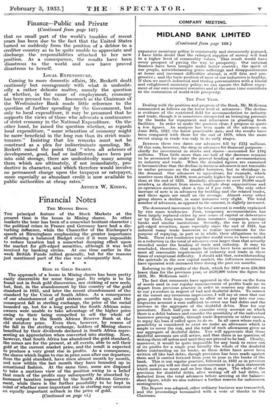RISE IN GOLD SHARES.
The approach of a boom in Mining shares has been pretty easily discernible for some time past. Its origin is to be found not in fresh gold discoveries, nor striking of new reefs, but, first, in, the abandonment by this country of the gold standard in 1931, and later the recent abandonment of the standard by the Union of South Africa. As a consequence of our abandonment of gold sixteen months ago, and the consequent fall in sterling exchange, the price of the metal bounded up, but for a long period the South African mine owners were unable to take advantage of the higher price owing to their being compelled to sell the whole of their output to the South African Reserve Bank at the old statutory price. Even then, however, by reason of the fall in the sterling exchange, holders of Mining shares benefited by their dividends declared in South Africa repre- senting an appreciation when converted into sterling. Now, however, that South Africa has abandoned the gold standard, the mines are for the present, at all events, able to sell their gold at the current market price, and the result is expected to produce a very great rise in profits. As a consequence, the shares which began to rise in price soon after our departure from the gold standard, have risen almost month by month, and now within the last month they have bounded up in sensational fashion. At the same time, some are d' to take a cautious view of the position owing to a belief that much of the profits may subsequently be absorbed by increased taxation imposed by the South African Govern- matt, while there is the further possibility to be kept in mind of whether some important rise in sterling may occasion an equally important setback in the price of gold.
(Continued on page vi.)




































 Previous page
Previous page